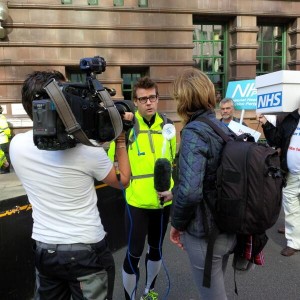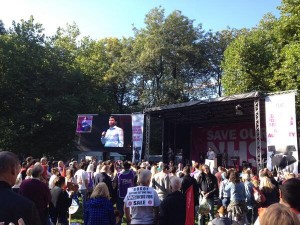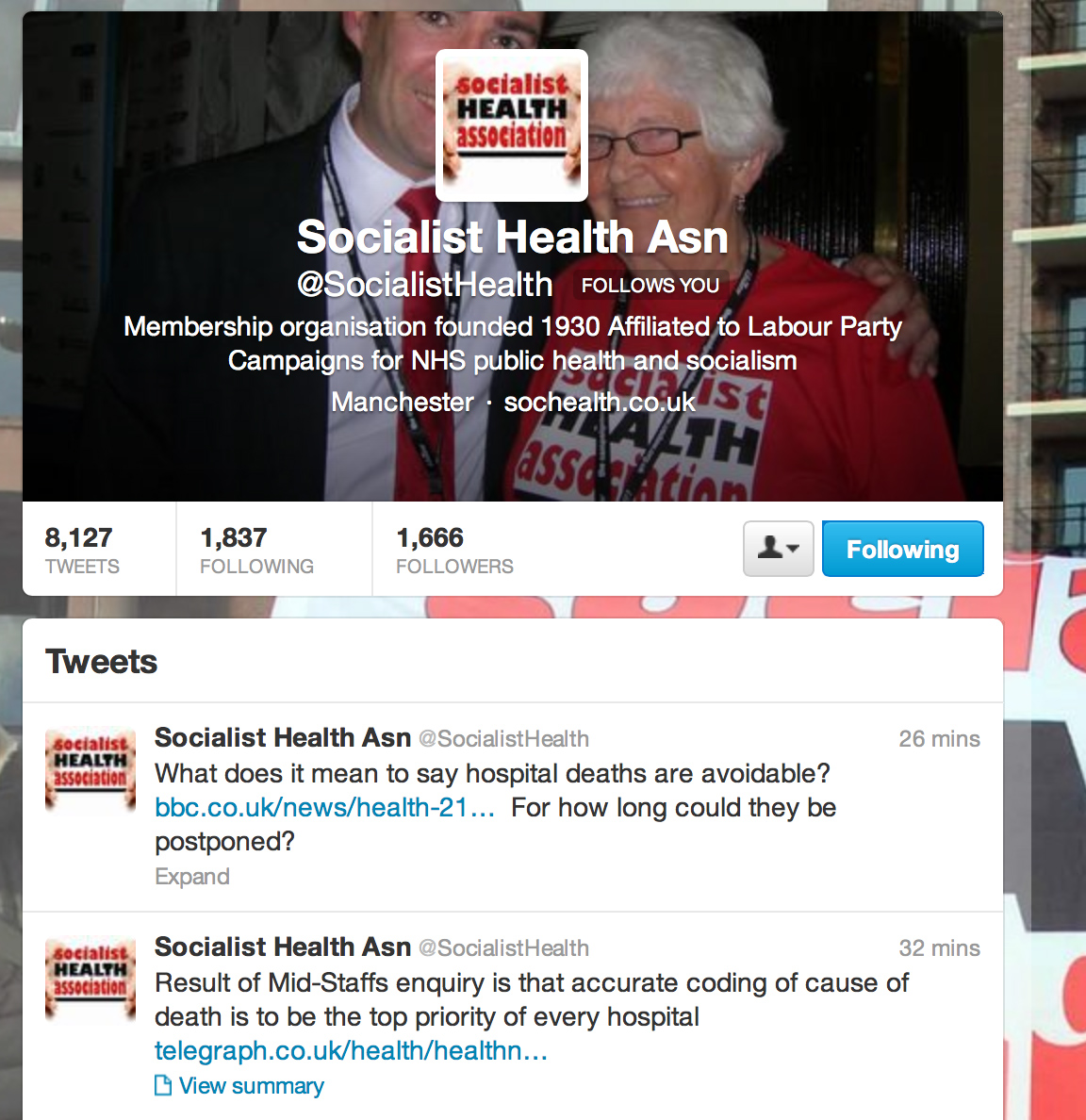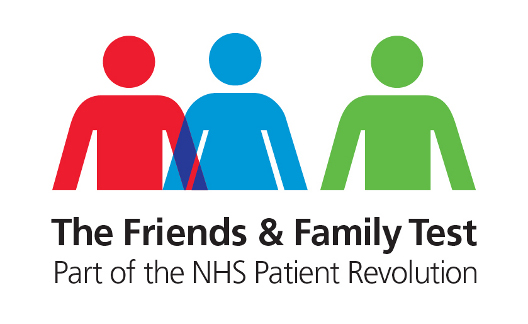Home » Campaigns (Page 2)
Why are the BBC so reluctant to cover the #NHS299 of ‘hardworking people’ today in Manchester?
Around 60,000 arrived today in Manchester for the first day of the Conservative Party conference to protest against austerity cuts and NHS changes. There was not a single arrest, at the time of publication of this blogpost.
The central accusation is that the executive members of the Conservative Party were able to legislate, with the help of Liberal Democrat votes, in the House of Commons and House of Lords for an act of parliament which made it very easy for contracts to be awarded to the private sector not the NHS or public sector. The cap allowed for income to be generated privately was massively uplifted.
It is specifically proposed that both legislative measures allowed the privatisation of the NHS through effectively outsourcing it. Andy Burnham MP, Shadow Secretary of State, has described this as making the NHS more like the US market, and has promised many times to reverse the marketisation and to repeal the Health and Social Care Act (2012). The ‘National Hospital Sell-Off’ (NHS), as it has now become described, was tweeted today by Burnham today to be “now advancing like a juggernaut. In last year alone, 81 major contracts – worth £4.5 billion – put out to market. #nhs299“.
The march set off at midday and passed through the centre of the city. It will end with speeches at a rally in Whitworth Park. Greater Manchester Police said that the mile long protest was one of the largest they had ever watched over, and that no arrests have been made.
Frances O’Grady, TUC general secretary, said beforehand: “The march and rally will allow thousands of ordinary people to show the government exactly what they think of their policies. Austerity is having a devastating effect on our communities and services, with 21,000 NHS jobs lost over the last three months alone. The NHS is one of Britain’s finest achievements and we will not allow ministers to destroy, through cuts and privatisation, what has taken generations to build.” Burnham has further embellished the central accusation by saying the biggest NHS ‘top down reorganisation’, not democratically called for, put profit before people.
As the march set off at noon, UNISON general secretary Dave Prentis was joined by Andy Burnham MP and health workers from George Eliot Hospital in Nuneaton, which is under threat of privatisation. Campaigners ensured that Twitter hashtag #NHS299 was trending right across the UK – emphasising the importance of the news, but getting the message across in the national media was exceptionally difficult due to lack of coverage from the BBC. 90 minutes after the first marchers had moved off, coaches were still reported to be arriving in Manchester, with the official Twitter account for the demonstration reporting that the front section was “holding at Albert Square for a bit to allow people to catch up”.
Cameron lied to the country over NHS privatisation, according to the leader of NHA Party ahead of Tory conference protest marathon
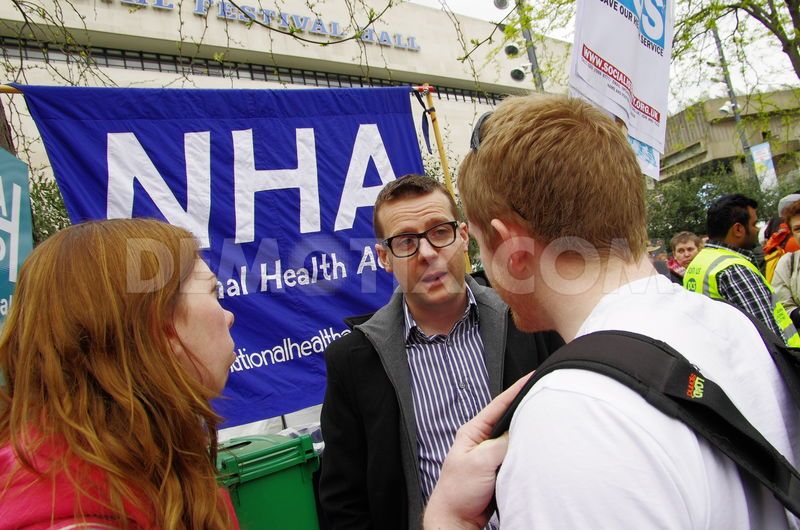 David Cameron blatantly lied to the country over NHS privatisation, says the co-leader of the National Health Action Party on the eve of his protest marathon to the Tory party conference.
David Cameron blatantly lied to the country over NHS privatisation, says the co-leader of the National Health Action Party on the eve of his protest marathon to the Tory party conference.
Dr Clive Peedell, who’s running 42 miles on Sunday morning from the HQ of NHS England in Leeds to Manchester, says there’s incontrovertible evidence that the Coalition is privatising the NHS – despite repeated claims by the Conservatives and Liberal Democrats that their NHS reforms would not lead to increasing privatisation.
Dr Peedell, the co-chair of the NHS Consultants Association also insists that privatisation of the NHS is a false economy as it is both expensive and inefficient.
In an article for Open Democracy, Dr Peedell demonstrates there is clear evidence that:
The Health and Social Care Act clearly fulfils all the commonly accepted criteria for healthcare privatisation, proving the Prime Minister has clearly misled the public, or in common language – lied.
He goes on:
If the public knew the full implications of what this would actually mean for the NHS, potential support for private provision of NHS services would plummet.
Dr Peedell argues forcefully against the assertion that it doesn’t matter who provides the service as long it’s free.
Privatisation needs a market… Market systems drain billions of pounds from the NHS budget and away from frontline care, by the creation of a huge bureaucracy of commercial contracts, accounting, legal challenges, advertising and billing.
He points out that administration costs of the NHS soared from 5% to 14% of total budget when Margaret Thatcher introduced the NHS internal market in 1991; this, he says, will increase further as “the current system is even more complex, bureaucratic and costly with three levels of bureaucracy replaced with seven”.
Dr Peedell explains that:
Private firms cherry pick the most profitable services… and leave local NHS Hospitals underfunded to pick up the pieces and deal with everything else they are expected to deal with – the full and comprehensive range of healthcare services to local communities.
And he warns that privatisation:
creates a vicious circle of increasing health care costs and financial pressure on the NHS. It leads to staff cuts, hospital and ward closures, increased waiting lists, and fewer core services provided by the NHS.
He explains how staff transfers from NHS hospitals to private hospitals (which don’t train their own staff) take vital expertise out of the NHS and how “patients have different parts of their care performed in different hospitals depending on the contracts that CCGs have signed up to. Quality is put at risk, expertise diluted, and costs driven up.”
He predicts that a failing NHS will only help boost private healthcare insurance for those that can afford it, “signalling the death knell for a universal healthcare service, free at the point of use.”
And he attacks “the revolving doors culture between the private health firms, politicians, think tanks, and civil servants within the Department of Health”.
Dr Peedell also demonstrates how the economy is damaged by the use of the private sector in the NHS:
Since public funds are used to pay for private sector provision of NHS services, taxpayers’ money is going directly into the profits of multi-national private companies and their shareholders. It is diverted away from direct patient care, and also diverted outside of our economy. Many of these companies are also registered in offshore tax havens. Privatisation of the NHS is a false economy.
Why have we all failed to communicate the “Sale of the Century”?
I include myself in this failure in communicating, “The Sale of the Century”. Despite tweeting the hell out of the issue @legalaware, I have to hold my hands up high, and say that “I’m sorry, I’m so so sorry”.
On April 1st 2013, the war is not quite over. The legal instruments to privatise the NHS come into effect. So why has this not been of interest to the media or the general public?
I still feel the general public is interested in the wider issue of NHS privatisation. A problem with campaigns such as 38 Degrees has been that many of the signatories, numbering in the millions, often cannot give a clear explanation of why they oppose NHS privatisation. Even fewer are less clear about how the privatisation came into being. Many people have even denied in an outright way that it is not privatisation but marketisation instead, and tend to refuse point-blank to concede that they were wrong (though drinking themselves at the last-chance saloon and having to change their viewpoints in the hope that nobody notices.)
It is tempting to blame it all on the media, especially the public sector broadcasters, but there is an alternative explanation for why they would willingly not wish to cover the “reforms”. The “reforms” have been such a slow-burn that it has been tricky for the media to identify what is new or newsworthy, and many journalists themselves may not have an accurate viewpoint of how this policy instrument has come about in the last two decades. Allyson Pollock and Colin Leys have tried with their books, Lucy Reynolds has tried with her video and papers, Caroline Molloy has tried with her tireless campaigning, Clive Peedell, Richard Taylor and the NHA Party have even tried to get the public behind this issue, but the legislation will come into force on 1 April 2013. Clare Gerada has been often been a lone voice in a sea of the medical Royal Colleges, though latterly the Royal Colleges did unite in opposition to the original NHS England procurement statutory instrument (“SI 2013/057″).
I strongly believe in a presumption of innocence, but I don’t feel SI 2013/057 was an accidental bit of dodgy drafting. I think the purpose of thrusting the NHS into new private markets was made all too clear, and the political class in virtual entirety, apart from Adrian Sanders, Andrew George or Caroline Lucas, have not explained what the problem is. The new Health and Social Care Act is a natural conclusion of throwing the NHS into privatised markets, compatible with EU competition law and international trade, and is a stepping stone in a policy which has seen the NHS engrossed in long-term loans at uncompetitive interest rates (PFI), expansion of “NHS Foundation Trusts” even if they run into public problems with patient safety and finances (nobody reasonable believes that Mid Staffs is an isolated affair, just look at Morecambe for example), and a whole series of failures where no political party can claim complete innocence apart from possibly the Greens.
So certain people can find someone else to blame, but that does not get rid of the fundamental problem. What do we do now? There are surely limitations in putting our eyes into the “raising awareness” basket. I suspect this situation has arisen because the political process is psychopathic (look at how Labour, Liberal Democrats, Conservatives, and “Hacked Off” have colluded behind closed doors to work on the ‘press regulation deal). I strongly feel that nothing will be done this side of a general election. The Labour Party have been less than forthcoming on their opposition to the latest statutory instrument (four MPs had signed it by this morning), there has been no press release about the new statutory instrument on the Labour website with people scrabbling desperately for any information from David Lock or Andy Burnham’s Twitter stream. If there is a hung parliament as widely predicted for 2015 between the Labour Party or Liberal Democrats, it will be business-as-usual. If the Conservatives win, it will be business-as-usual. Labour have offered to repeal the Act, but even they might lose their mojo if Andy Burnham moves onto bigger and better things?
And as for the NHS? This privatisation has offered thus far no funding solutions for a service in difficulty, nor any immediate solutions for families devestated by failures of the NHS. There is much to be proud of, however, in the NHS, and many would like to see the NHS succeed. But it does need someone to take the bull-by-the-horns, and to show real leadership at a time which really could turn out to be a crisis.
The @NHAParty “may have been influenced in its aims by activity over Twitter”
Here is the @SocialistHealth to keep up-to-date with all the news from the Socialist Health Association [correct as of this morning]:
- The importance of Twitter is explained in the introduction:
“Social media is distinguished from traditional broadcast and print media by its ‘user generated’ content – the people who read it are the ones writing it and commenting on it. A prominent social media outlet is Twitter, the global online micro-blogging social network that is accessed by millions of users every day. Twitter enables its members to post text-based messages of up to 140 characters about any topic. The short format of the message – or tweet – is the defining characteristic of the service. Twitter and other social media provide users with the opportunity to share opinions widely and to interact with and potentially influence key decision-makers. As Twitter has entered mainstream use, the hashtag appears to have come of age politically. Recent regime changes in Egypt and Libya have been labelled ‘Twitter revolutions’, whilst the re-election of Barack Obama in 2012 was termed the first ‘Twitter election’ [1]. Whilst these terms may overstate the actual role of Twitter, it hints at Twitter’s soaring popularity and potential importance.
Twitter has become a popular platform for scrutiny of the UK coalition Government’s reform of the English National Health Service (NHS) [2].”
The authors identified the importance of “re-tweets”:
“People disseminate information deemed important on Twitter through ‘retweets’. This is when someone chooses to repeat a tweet by someone else, usually because they think the content is significant enough to merit sharing further. Twitter is well suited to studying influence because the diffusion of ideas can be tagged and observed, allowing us to determine how effective different ‘messengers’ of information are [10] and [11].”
The “most influential Tweeters” appear to be based in London:
“Determining the characteristics of tweeters is dependent on what information users are willing to enter about themselves on their public profile. Looking at the 100 most influential tweeters measured by the T-index, 77 of the 100 identified themselves as being from the UK with 43 stating they were based in London. No tweeter in the Top 100 identified themselves as being from or based outside the UK.”
The authors make interesting observations on the”non-hierarchical nature of Twitter”:
“Twitter represents a genuinely diverse platform for discussing health reform. Previously doctors have often limited themselves to their own networks, such as doctors.net. Twitter allows conversations to take place between regular NHS workers and opinion leaders such as journal editors, journalists and royal college presidents. This non-hierarchical approach is attractive in allowing voices of the frontline to be heard in an unfiltered manner, however, it may also reflect the small number of people using the medium. If it becomes more populated and widely used, it is possible that this effect will be diluted.”
And, finally, the NHA Party may have been influential in affecting the Reforms:
“Although not captured in the time frame of this analysis, the subsequent development of the National Health Action party (@NHAParty), a single issue political party campaigning against the reforms, may have been influenced in its aims by activity over Twitter, and includes prominent tweeters among its founding members and campaigns extensively using social media [17].”
Would you recommend this government to your friends and family?
Would you recommend this government to your friends and family?
— legal aware(@legalaware) February 19, 2013
@legalaware Not on your nelly ……
— jane lutkin (@JaneLutkin) February 19, 2013
@legalaware Wouldn’t recommend them 2 my worse enemy. No-one deserves the lies, manipulation and depredations of these self serving monsters
— Marilyn Jenkins (@croescade) February 19, 2013
@legalaware recommend it for what? !!
— Tes Smith (@TTESmith) February 19, 2013
@legalaware simlpe that one no
— rosalinde armiger (@rosalindearmige) February 19, 2013


